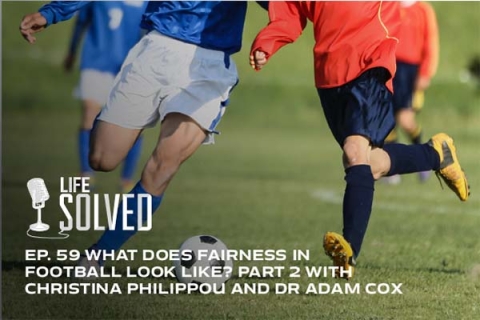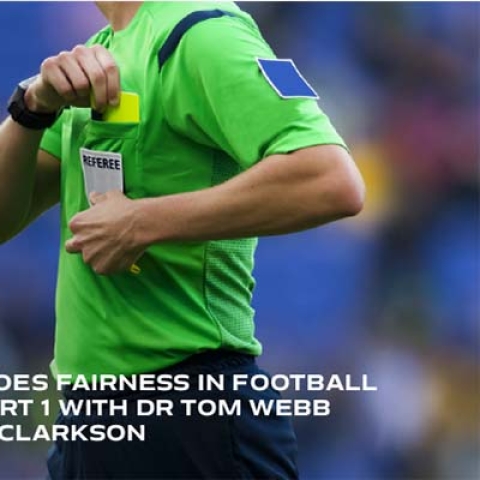

Clearing up corruption in football
25 min listen
Tackling Corruption and Financial Mismanagement In Football
Today, football is a 1.8 billion dollar global industry, but research at the University of Portsmouth is unravelling just how unstable the books are of clubs in the UK.
In the latest episode of the Life Solved podcast, Christina Philippou and Dr Adam Cox share insights into financial mismanagement and its impacts on people in football.
Cleaning up the game
Christina has a background in accounting and in the past has led investigations into fraud for big industries. But when she came to academia, she was able to unite this with her love of sport. She continues to coach today but is keen to be a part of cleaning up the historic bribery and corruption that has dogged football and its finances.
She says that the misplacement and mismanagement of funds mean that development and grass-roots schemes can suffer.
There are still so many issues in terms of conflict of interest, whistleblowing and confidentiality.
Christina Philippou, Principal Lecturer
Unstable finances
Where it might seem that there’s plenty of money to go around in football, it seems that it’s not necessarily going to all the right places. Christina’s been working with Dr Adam Cox to analyse the balance sheets of Premier League clubs across the last 30 years. They were surprised to see that despite increasing broadcast and rights revenues over time, there still existed a debt of £1bn!
All we needed to see was a drop of, say, 20 percent in those broadcast revenues in one season and 13 of the 20 clubs would make a loss that season.
Dr Adam Cox, Principal Lecturer in Economics and Finance
Adam says a heavier reliance on broadcast revenues and the competitiveness of player spending is behind the overspending that leaves clubs financially unstable. He says the same problems are present in smaller clubs and those lower down the leagues. Even if clubs are sold with debt and saved, the suppliers and aligned services still lose out, and those relying on income face hardship.
What’s more, Adam suggests that clubs in a stronger financial position will be able to better support community activities.
How to make all sport fairer, financially
Christina’s background in governance and regulation has also led her to look at the systems and processes that can make a sporting association fairer. She’s also looked at the International Tennis Federation and says that transparency and accountability are key, from publishing up to date accounts to making stakeholders aware of how money is being spent and what decisions are being made. She says that monitoring and audits can also help deter fraud and other corruption.
There are loads of areas whereby you don't know what's happening within an organisation, which is supposed to be a public organisation that is supposed to be looking after the sport for everybody. And you don't have access to what's happening.
Christina Philippou, Principal Lecturer
It’s not to say that recent strides haven’t been made to increase financial controls and increase transparency in the game, but Adam says more research needs to take place to find out what’s truly happening at all levels of the league. It’s hoped that this will help decisions and actions take place to make a fairer game for all.
To listen to the full podcast, search for “Life Solved” from the University of Portsmouth on your podcast app of choice, and why not share this story with a friend who might be interested.
Episode transcript:
John Worsey: Thanks for joining us for Life Solved. I’m John Worsey and here at the University of Portsmouth we work on sharing amazing research, breakthroughs and cutting-edge science with the world. Much of our research is informing and exploring the way we live today, including our cultures and society. Today we’re returning to our conversation around fairness in football. The World Cup, Euros and Championships unite nations across the world, as well as communities, counties, regions and states. And it plays a crucial role in the cultural and economic identities that exist therein. But the financial state of football is far from healthy, and financial mismanagement or corruption can have devastating impacts:
Christina Philoupou: If a club goes into administration and their wages don't get paid, that is a problem.
John Worsey: This time we’ll reveal some surprising truths about football’s shaky accounting. Just how financially stable are the clubs at every level of the game? And we’ll ask how it might be possible to eliminate corruption for good. If sport can add to and amplify behaviours and attitudes throughout a wider society, the way it’s financed and regulated is absolutely crucial in making it fair for everyone, internationally. Dr Adam Cox and Christina Philippou share their insights.
Christina Philoupou: My name's is Christina Philouppou. I am a principal lecturer here and I'm my background is as an accountant (fun times), but most of my research revolves around the interesting side, which is sport finance and corruption. My kind of practical experience is around investigations in corruption and fraud and oil and regulatory investigations. And then when I came to Portsmouth, then I had to actually do some sort of research. I've always been a big sports fan. I've watched sport all my life. I've played sport all my life. I now coach sport, so it kind of made sense to put the two together. And it's actually been very interesting, but also rather depressing
What does fairness in football look like equality
21 February 2022
20 min listen

Do animals really know what we are thinking?
In the latest episode of the Life Solved podcast, Dr Leanne Proops talks about the psychology of relationships between pets and humans
8 March 2022
20 min listen

